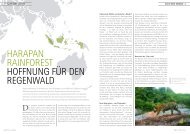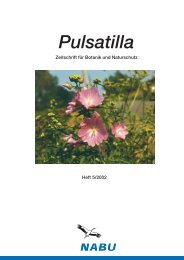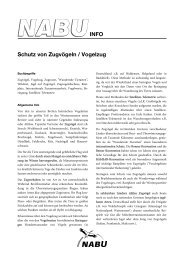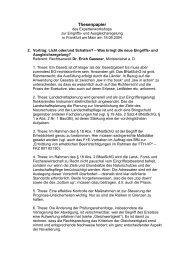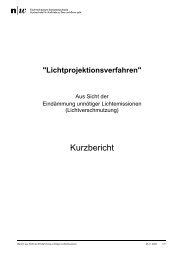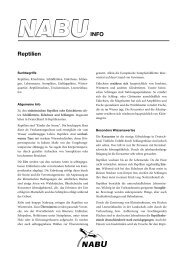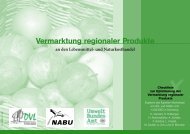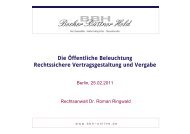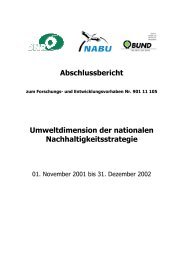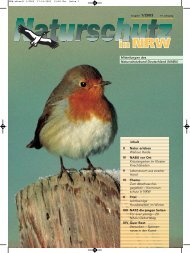Studie "The GMO-emperor has no clothes" (engl.) - Nabu
Studie "The GMO-emperor has no clothes" (engl.) - Nabu
Studie "The GMO-emperor has no clothes" (engl.) - Nabu
You also want an ePaper? Increase the reach of your titles
YUMPU automatically turns print PDFs into web optimized ePapers that Google loves.
VI (B) Record of Monsanto<br />
Dr. P.M. Bhargava*<br />
! 1969: Produces Agent Orange, which was used<br />
as a defoliant by the U.S. Government during the<br />
Vietnam War. I have myself seen defoliated trees<br />
over a hundred miles south of Ha<strong>no</strong>i in 1982.<br />
! 1976: Monsanto produces Cycle-Safe, the<br />
world’s first plastic soft-drink bottle. <strong>The</strong> bottle,<br />
suspected of posing a cancer risk, is banned<br />
the following year by the Food and Drug<br />
Administration of the U.S.<br />
! 1986: Monsanto found guilty of negligently<br />
exposing a worker to benzene at its Chocolate<br />
Bayou Plant in Texas. It is forced to pay $100<br />
million to the family of Wilbur Jack Skeen, a<br />
worker who died of leukaemia after repeated<br />
exposures.<br />
! 1986: Monsanto spends $50,000 against<br />
California’s anti-toxics initiative, Proposition 65.<br />
<strong>The</strong> initiative prohibits the discharge of chemicals<br />
k<strong>no</strong>wn to cause cancer or birth defects into<br />
drinking water supplies.<br />
! 1987: Monsanto is one of the companies<br />
named in an $180 million settlement for Vietnam<br />
War veterans exposed to Agent Orange.<br />
! 1988: A federal jury finds Monsanto Co.’s<br />
subsidiary, G.D. Searle & Co., negligent in testing<br />
and marketing of its Copper 7 intrauterine birth<br />
control device (IUD). <strong>The</strong> verdict followed the<br />
unsealing of internal documents regarding safety<br />
concerns about the IUD, which was used by<br />
nearly 10 million women between 1974 and 1986.<br />
! 1990: EPA chemists allege fraud in Monsanto’s<br />
1979 dioxin study which found their exposure to<br />
the chemical doesn’t increase cancer risks.<br />
! 1990: Monsanto spends more than $405,000<br />
to defeat California’s pesticide regulation<br />
Proposition 128, k<strong>no</strong>wn as the “Big Green”<br />
initiative. <strong>The</strong> initiative was aimed at p<strong>has</strong>ing<br />
out the use of pesticides, including Monsanto’s<br />
product Alachlor, linked to cancer and to global<br />
warming.<br />
! 1991: Monsanto is fined $1.2 million for trying<br />
to conceal discharge of contaminated waste water<br />
into the Mystic River in Connecticut.<br />
! 1995: Monsanto is sued after allegedly<br />
supplying radioactive material for a controversial<br />
study which involved feeding radioactive iron to<br />
829 pregnant women.<br />
! 1995: Monsanto ordered to pay $41.1 million<br />
to a waste management company in Texas due to<br />
concerns over hazardous waste dumping.<br />
! 1995: <strong>The</strong> Safe Shoppers Bible says that<br />
Monsanto’s Ortho Weed-B-Gon Lawn Weed<br />
Killer contains a k<strong>no</strong>wn carci<strong>no</strong>gen, 2,4 D.<br />
! 2005: According to the U.S. Securities &<br />
Exchange Commission, Monsanto bribed<br />
at least 140 Indonesian officials or their<br />
families to get Bt cotton approved without an<br />
environmental impact assessment (EIA). In<br />
2005, Monsanto paid $1.5 million in fines to the<br />
US Justice Department for these bribes.<br />
! 2005: Six Government scientists including<br />
Dr. Margaret Haydon told the Canadian Senate<br />
Committee of Monsanto’s ‘offer’ of a bribe<br />
of between $1-2 million to the scientists from<br />
Health Canada if they approved the company’s<br />
GM bovine growth hormone (rbGH) (banned<br />
in many countries outside the US), without<br />
further study, and how <strong>no</strong>tes and files critical<br />
of scientific data provided by Monsanto were<br />
stolen from a locked filing cabinet in her office.<br />
One FDA scientist arbitrarily increased the<br />
allowable levels of antibiotics in milk 100-fold in<br />
order to facilitate the approval of rbGH. She had<br />
just arrived at the FDA from Monsanto.<br />
! 2005: <strong>The</strong> US Patent and Trademark Office<br />
rejected four key Monsanto patents related to<br />
GM crops that the Public Patent Foundation<br />
(PUBPAT) challenged because the agricultural<br />
giant is using them to harass, intimidate, sue -<br />
and in some cases bankrupt - American farmers.<br />
Monsanto devotes more than $10 million per<br />
year to such anti-farmer activities, over alleged<br />
improper use of its patented seeds.<br />
! 2005: <strong>The</strong> Alabama Court Judgement in<br />
51



